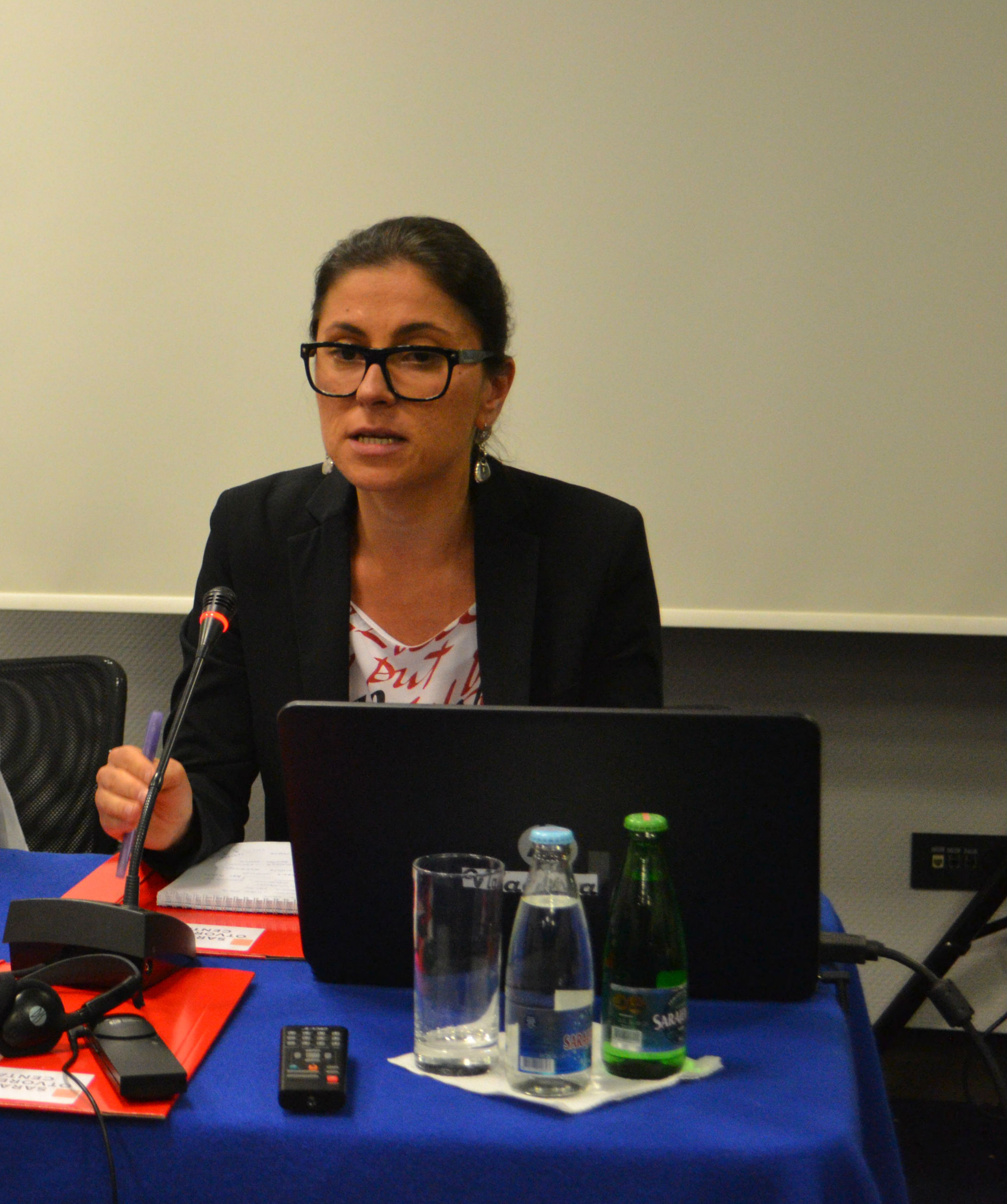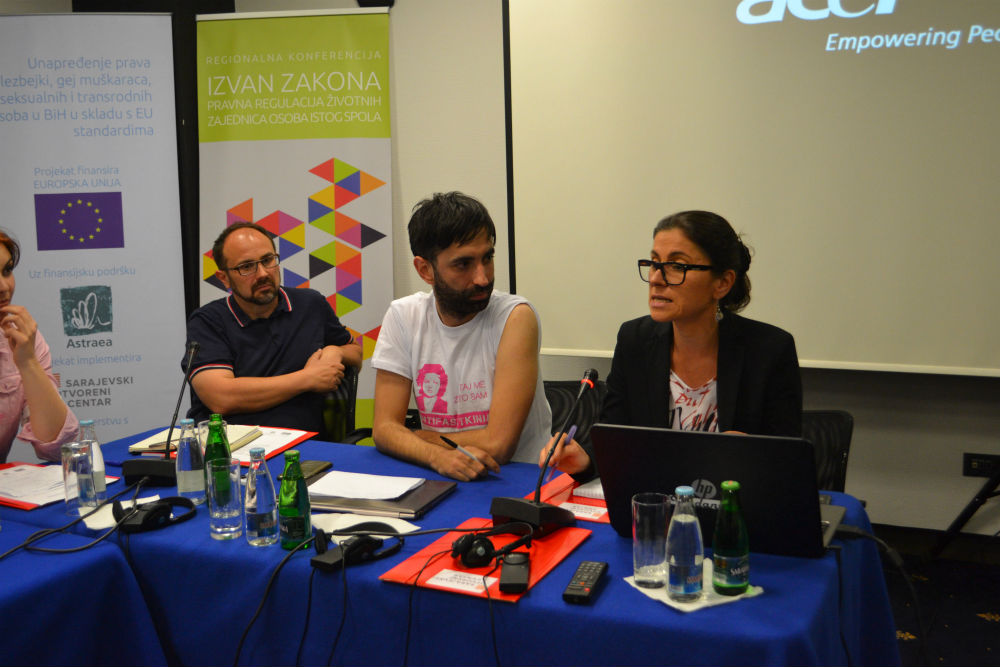Before it becomes a part of the European Union, Serbia will have to satisfy many conditions concerning economy, law, anti-corruption, but also democracy, freedom of speech and human rights. Speaking of set of conditions regarding the respect for human rights, we also speak about LGBT rights, which is one of the most vulnerable groups in Serbia. The authorities cannot simply ignore issues concerning LGBT community anymore, and it is only a matter of time when Serbia becomes a country where LGBT people can have all the rights and, of course, the obligations. The question of the same-sex marriage is the crucial question. Five years ago, the organization for lesbian human rights Labris brought up the question of legal recognition for the same-sex relationships. We spoke with Dragana Todorović about what is currently happening in this field. Todorović is a project manager in Labris organization.
 Interviewer: Dalibor Tanić
Interviewer: Dalibor Tanić
Photo: Marija Vuletić
English translation: Jovana Jović
LBGT.ba: Legalized same-sex marriage will become a reality in Serbia at one point, and it is only a matter of time when this will happen. At the moment, what is the closest equivalent to the legalization of same-sex marriages in Serbia?
TODOROVIĆ: You are right, marriage equality will undoubtedly become reality in Republic of Serbia at one point, too. By getting closer to the democratic standards of developed countries, no matter how much that process might be slow and controversial, decision makers will not be able to ignore the demands of the ever stronger LGBTI community for much longer. If they do, they will negate the reality of a great number of same-sex couples that have been living in long-term relationships, in which they often have children.
These families are like any other, and there is no reason why they could not have the same rights like heterosexual families. Arguments against it are based on the alleged respect for tradition, as well as on the irrational fear that marriage equality will lead to decrease in natality, extinction of the “real” family, and Serbian nation as such. These arguments are either ill-intended manipulation or simply unintelligent beliefs.
Labris is an organization for lesbian human rights that stands for marriage equality of same-sex and heterosexual couples. Back in 2010, Labris started the topic of legal recognition for same-sex relationships in the public discourse of Republic of Serbia. The first step would be to at least ease everyday problems of LGBTI people in relationships, including issues of inheriting, supporting, health insurance, hospital visits, etc. This would mean technical and operative regulation of a relationship between two people, without solving the problem of child adoption or using the term “marriage”, which unfortunately carries unjustified ideological weight with it and is supposedly in opposition with traditional Serbian values. This would also be the first step towards complete equality between heterosexual and same-sex marriages, which, of course, would have to be preceded by the changes in the Constitution of Republic of Serbia.
LGBT.ba: Early in June of 2013, a model of registered same-sex relationships law was presented. In what stage is this law model after two years?
TODOROVIĆ: The model of registered same-sex relationships was formulated by both Serbian and foreign legal experts back in 2010. After that came intensive and comprehensive consultations with social groups, LGBTI organizations foremost, other human rights organizations, and relevant institutions that were interested. On one hand, LGBTI organizations, other non-governmental organizations, as well as LGBTI individuals graded the Law positively and made its content better with their constructive suggestions. On the other hand, although they initially expressed readiness to start the processes that would lead to adopting the aforementioned law model, representatives of the institutions showed the opposite by stopping every dialogue with us when the media reported about the content of the dialogue with the institutions in an inadequate and sensationalistic way. Unfortunately, this is just another example of lack of leadership and courage.
The authorities in Republic of Serbia, if they want to do their job properly, have to understand that successful management of a society in transition also requires their role as emancipators and reformers, and not just pleasing the voters. That is why the processes that would lead to the opening of public discussion and adopting this law in Republic of Serbia have been halted for a while now.
LGBT.ba: What was this model supposed to envision and was it the first step towards equality of same-sex and heterosexual marriage?
TODOROVIĆ:The recommended law model regulates technical and legal relations that would consolidate mutual rights and obligations of same-sex couples and their recognition in different situations. Among other things, this means the application of regulations that are concerned with inherence legislation, pension, civil legislation and family legislation, but also those regulations that regulate different procedures, like criminal and administrative cases, hospital visits, prison visits, etc. This law model does not envision full legal equality between heterosexual and same-sex relationships, because it does not include the right to child adoption. However, as we think that LGBTI community has the right to full marriage equality, and taking into consideration positive tendencies across Europe and the USA, at the moment we are in the process of considering changes of this law model that would include the right to child adoption as well.
LGBT.ba: How did the leading politicians accept this law model back then?:
TODOROVIĆ: When this law model was presented, politicians, representatives of legislative and executive powers, as well as the representatives of independent institutions were opened for starting a dialogue about this, as they often called it, “touchy” topic. At first, their reaction was surprisingly positive, and gave us a reason to think that the whole process would go easier than we had expected. However, when the actual steps towards adopting this law had to be taken, it soon turned out that their support was only declarative and untrue. As I have said before, after the media found out about the conversations that we had with the government representatives about the law, all doors had been shut for us. Nevertheless, I hope that we have learned something and at the moment our strategy is going through a revision. This is the strategy that we will apply throughout 2016 and 2017.
 LGBT.ba: Undoubtedly, the right-oriented groups in Serbia are a great barrier in the struggle for legalizing same-sex marriages. Do you think that they will be the last barrier to pass, in order for the same-sex marriage to be equal and recognized by law?
LGBT.ba: Undoubtedly, the right-oriented groups in Serbia are a great barrier in the struggle for legalizing same-sex marriages. Do you think that they will be the last barrier to pass, in order for the same-sex marriage to be equal and recognized by law?
TODOROVIĆ: Current social-political circumstances in Serbia are such that it seems difficult to determine what are right-oriented groups, and how much of a barrier they might be. I say it seems, because at the moment Serbian Progressive Party, which is a camouflaged Serbian Radical Party, holds the absolute power. Recently, SPP replaced its right-oriented, nationalistic, xenophobic rhetoric with Euro-reformation one. From the experience with people that are currently in charge, we cannot allow ourselves to be naive and easily trust that this change is true and that they truly understand that respect of human rights is one of the basic values of European Union. Other right-oriented groups, both formal and informal ones, are either under the absolute control of Serbian Progressive Party or they are on the margins of political and social influence. In other words, the influence of right-oriented groups will mostly depend on rhetoric and actions of SPP. At the moment, it is hard to predict, but there are indications that Serbian Progressive Party will go along with the question of legalizing same-sex partnerships for the successful integrations into the EU, no matter how hard it might be for them.
LGBT.ba: During all these years, the media follows what is going on with the LGBT community in general, especially the activities concerning same-sex marriages. What “partner” do the media make and do you have an idea of what kind of image they have created while reporting about these topics?
TODOROVIĆ: Just like it is important to inform the general public about what the legal regulating of same-sex partnerships is and why it is important, it is equally significant to create a dialogue with the representatives of the media, who are often homophobic and transphobic themselves despite their profession, so they often create stereotypical and discriminatory attitudes towards LGBTI people.
Having this in mind, Labris dedicated a lot of attention to education of reporters, primarily in the area of basic informing about what LGBTI identities mean, in what position LGBTI people are in Serbia, what the most common stereotypes and prejudices towards LGBTI people are, as well as what the adequate way of reporting about topics concerning LGBTI people is. These educational activities were quite successful, but they had a limited influence. In other words, media editors who decided what kind of media content would be presented to the public rarely took part in these activities. That is why negative and sensationalistic media content kept appearing.
In order for us to make tighter and more efficient partnership with the media, we must concentrate on working with the editors in the period to come. This would definitely be a part of the new Labris strategy of advocacy in the area of the right to a marital and family life.
LGBT.ba: Do you have any knowledge about the support of the citizens for the same-sex marriage in Serbia?
TODOROVIĆ: Before we started the campaign of presenting the law model about registered same-sex relationships, we wanted to do a research on what the citizens in Serbia really think about it. The representative research that was done in 2012 showed that only 36% of the citizens support some degree of equality, foremost the right to social insurance through the partner (62%), the right to inheriting property (60%), the right to pension through the partner (53%), and the right to a registered partnership (45%). Significantly less citizens support the right to marry (22%) and the right to child adoption (9%). Representative research that was done two years later, in 2014, showed an even lesser support of the citizens of Serbia. Only 20% of citizens support some degree of same-sex relationship legal regulation, while 13% would have nothing against same-sex marriage.
These results did not surprise us, having in mind that the research continually shows that over 65% of the citizens still think that homosexuality is a disease and social threat, and that the state should work on its extinction. We also understand that positive changes in this area come slowly and that constant and hard work in informing the general population about LGBTI identities and rights is necessary. The research also shows that only 10% of the population knows a LGBTI person, and that is the part of the population that has the most positive attitudes towards LGBTI people. So, we need more LGBTI people that have come out to speak authentically and publically about their existence.
LGBT.ba: Do you think that politicians do not have a strong attitude about same-sex marriage, but are bending according to the public opinion?
TODOROVIĆ: From my working experience so far, I can conclude that most of the politicians in truth does not support the idea of marital-family equality between heterosexual and same-sex couples. What has been changing lately is that they will not say that openly, because in the meantime they learned that it is not politically correct. However, with their (in)actions they clearly show lack of readiness to deal with this topic. Some of them adjust according to the dominant public opinion, although privately they have positive attitudes, while some others strongly object the idea, thinking that homosexual relations are unnatural, that they have a negative influence on traditional and family values, moral of the nation and natality, as much as it is irrational and incorrect. As I have said before, I think that a lot of politicians in Serbia lack courage, leadership, responsibility and knowledge.
LGBT.ba: Having in mind that the state has made and adopted the Strategy for Prevention and Protection against Discrimination, as well as an Action Plan for enforcing the Strategy, do these documents also contain the measures that concern legal regulation of same-sex partnerships?
TODOROVIĆ: One of the most significant steps forward, when it comes to the LGBTI rights in Republic of Serbia, is the adopting of comprehensive national Strategy for Prevention and Protection against Discrimination for the period from 2014 to 2018, as well as the Action Plan related to it. Labris took an active part in formulating the Strategy and making of the Action Plan. We have managed to influence on implementing the question of legal registration of same-sex partnerships into both documents. However, we are not pleased with the decision that the deadline for adopting the law is 2017, as we stood against it. We think that there is no reason that this question of socio-economical significance for stability and quality of LGBTI people’s lives is postponed so much. I am afraid that this in fact shows lack of political will, and points at the promises from the Strategy and the Action Plan remaining a dead letter.
LGBT.ba: When will Serbia be ready to make same-sex marriages equal with the heterosexual ones?
TODOROVIĆ: Having in mind all that has been previously said, it is hard to answer this question with precision. It is my opinion that the authorities will not do anything on their own, although they are obliged to it by Strategy and its Action Plan. I think that everything depends on the efforts and pressures of LGBTI organizations, and by that I primarily think of Labris. It also depends on the readiness of international organizations and institutions to help us in all of this. If we are organized properly, if we design an efficient strategy, if we apply the lessons we learned in our past and the lessons from the region and the rest of the world, if we are brave and persistent, I am sure that the results will deliver.
In the light of a recent decision of the American Supreme Court, which made same-sex marriages possible on the territory of the entire United States of America, and the positive outcome of Ireland referendum, as well as other positive examples of more than a half of the Council of Europe country members, I still hope that Republic of Serbia will soon join this positive and unstoppable global trend.
At the moment in which I’m writing this, I am in Brussels, visiting my long-time friends, Jana and Olimpia, who left Romania and Slovakia respectively in search for a place where they can feel safe and proud. Here, they found jobs and bought a house, got married and had a daughter named Alexis, who is now 10 months old. Never before had I seen a happier baby or one that smiles more. They found support everywhere, in the street, in the neighbourhood, in the kindergarten, city administration, medical institutions… Everywhere. Every year, the mayor of Brussels invites them for a cocktail as a sign of support for the same-sex relationships.
I want to believe that this is possible in Republic of Serbia as well, and I wonder how many same-sex couples justifiably left Serbia so far, because of the same reasons that my friends Olimpia and Jana had. I choose to stay, and together with my co-workers at Labris give my best to have an influence on creating the circumstances in which LGBTI people in Serbia can live safely, freely, and proudly.
This text is a part of “All about Love Rules” campaign, led by Sarajevo Open Centre and Mediacentar Sarajevo Foundation, as a part of the “Promotion of lesbian, gay men, bisexual and transgendered people in Bosnia and Herzegovina in accordance with EU standards” project that is funded by European Union with the financial support of Astraea Foundation.





